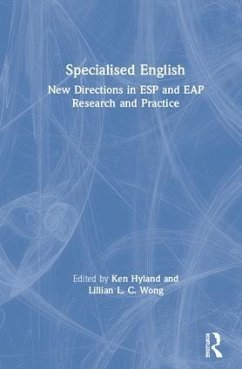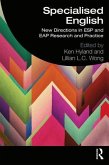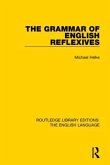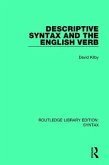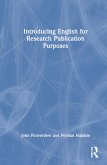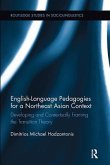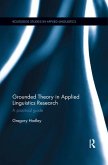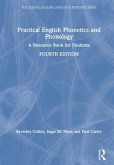Specialised English
New Directions in ESP and EAP Research and Practice
Herausgeber: Hyland, Ken; Wong, Lillian L C
Specialised English
New Directions in ESP and EAP Research and Practice
Herausgeber: Hyland, Ken; Wong, Lillian L C
- Gebundenes Buch
- Merkliste
- Auf die Merkliste
- Bewerten Bewerten
- Teilen
- Produkt teilen
- Produkterinnerung
- Produkterinnerung
This book provides an authoritative and cutting-edge account of the latest avenues of research and practice in the dynamic field of Specialised English.
Andere Kunden interessierten sich auch für
![Specialised English Specialised English]() Specialised English66,99 €
Specialised English66,99 €![The Grammar of English Reflexives The Grammar of English Reflexives]() Michael HelkeThe Grammar of English Reflexives62,99 €
Michael HelkeThe Grammar of English Reflexives62,99 €![Descriptive Syntax and the English Verb Descriptive Syntax and the English Verb]() David KilbyDescriptive Syntax and the English Verb60,99 €
David KilbyDescriptive Syntax and the English Verb60,99 €![Introducing English for Research Publication Purposes Introducing English for Research Publication Purposes]() John FlowerdewIntroducing English for Research Publication Purposes204,99 €
John FlowerdewIntroducing English for Research Publication Purposes204,99 €![English Language Pedagogies for a Northeast Asian Context English Language Pedagogies for a Northeast Asian Context]() Michael HadzantonisEnglish Language Pedagogies for a Northeast Asian Context71,99 €
Michael HadzantonisEnglish Language Pedagogies for a Northeast Asian Context71,99 €![Grounded Theory in Applied Linguistics Research Grounded Theory in Applied Linguistics Research]() Gregory HadleyGrounded Theory in Applied Linguistics Research66,99 €
Gregory HadleyGrounded Theory in Applied Linguistics Research66,99 €![Practical English Phonetics and Phonology Practical English Phonetics and Phonology]() Beverley CollinsPractical English Phonetics and Phonology205,99 €
Beverley CollinsPractical English Phonetics and Phonology205,99 €-
-
-
This book provides an authoritative and cutting-edge account of the latest avenues of research and practice in the dynamic field of Specialised English.
Hinweis: Dieser Artikel kann nur an eine deutsche Lieferadresse ausgeliefert werden.
Hinweis: Dieser Artikel kann nur an eine deutsche Lieferadresse ausgeliefert werden.
Produktdetails
- Produktdetails
- Verlag: Routledge
- Seitenzahl: 276
- Erscheinungstermin: 9. April 2019
- Englisch
- Abmessung: 240mm x 161mm x 19mm
- Gewicht: 581g
- ISBN-13: 9781138588752
- ISBN-10: 113858875X
- Artikelnr.: 56895231
- Herstellerkennzeichnung
- Libri GmbH
- Europaallee 1
- 36244 Bad Hersfeld
- gpsr@libri.de
- Verlag: Routledge
- Seitenzahl: 276
- Erscheinungstermin: 9. April 2019
- Englisch
- Abmessung: 240mm x 161mm x 19mm
- Gewicht: 581g
- ISBN-13: 9781138588752
- ISBN-10: 113858875X
- Artikelnr.: 56895231
- Herstellerkennzeichnung
- Libri GmbH
- Europaallee 1
- 36244 Bad Hersfeld
- gpsr@libri.de
Ken Hyland is Professor of Applied Linguistics in Education at the University of East Anglia. He is a Foundation Fellow of the Hong Kong Academy of the Humanities and an Honorary Professor at Warwick University, Jilin University and Hong Kong University. Lillian L. C. Wong is a Senior Lecturer in the Centre for Applied English Studies at the University of Hong Kong. She researches innovation and change in English language education, EAP and ESP, and has extensive experience developing, teaching and coordinating undergraduate, postgraduate and teacher education programmes.
Preface Brian Paltridge
Introduction Ken Hyland and Lillian L. C. Wong
Section one: Conceptual issues in specialised language use
1. Academically speaking: English as the Lingua Franca Anna Mauranen
2. What do we mean by 'Workplace English'? A syllabus framework for course
design and assessment Jane Lockwood
3.Genre as interdiscursive performance in English for Professional
Communication Vijay K. Bhatia
4. Power in English for Academic Purposes John Flowerdew
5. EAP practitioner identity Alex Ding
Section two: Focus on texts
6. English as a Lingua Franca and Learner English in Disciplinary Writing:
A corpus perspective Lynne Flowerdew
7. Academic interaction: Where's it all going? Ken Hyland
8. Exploring critical thinking in academic and professional writing: A
genre-based approach Ian Bruce
9. Vocabulary in university tutorials and laboratories: Corpora and word
lists Averil Coxhead and Thi Ngoc Yen Dang
10. Researching the impact of 'the culture order' in professional workplace
contexts Janet Holmes
11. Multimodal student texts: Implications for ESP Jean Parkinson
Section three: Focus on practice
12. Grappling with the personal statement: Transformation, appropriation,
and externalization Ann M. Johns
13. Tools and strategies for Data-Driven Learning (DDL) in the EAP writing
classroom Laurence Anthony
14. Implementing disciplinary data-driven learning for postgraduate thesis
writing LillianL. C. Wong
15. Academic writing feedback: Collaboration between subject and EAP
specialists Jill Northcott
16. Directives in academic writing tutorials: How do different teaching
styles affect their use? Ursula Wingate and Eva Ogiermann
17. Seeking supervisor collaboration in a School of Sciences at a Chinese
university Yongyan Li and Margaret Cargill
Index
Introduction Ken Hyland and Lillian L. C. Wong
Section one: Conceptual issues in specialised language use
1. Academically speaking: English as the Lingua Franca Anna Mauranen
2. What do we mean by 'Workplace English'? A syllabus framework for course
design and assessment Jane Lockwood
3.Genre as interdiscursive performance in English for Professional
Communication Vijay K. Bhatia
4. Power in English for Academic Purposes John Flowerdew
5. EAP practitioner identity Alex Ding
Section two: Focus on texts
6. English as a Lingua Franca and Learner English in Disciplinary Writing:
A corpus perspective Lynne Flowerdew
7. Academic interaction: Where's it all going? Ken Hyland
8. Exploring critical thinking in academic and professional writing: A
genre-based approach Ian Bruce
9. Vocabulary in university tutorials and laboratories: Corpora and word
lists Averil Coxhead and Thi Ngoc Yen Dang
10. Researching the impact of 'the culture order' in professional workplace
contexts Janet Holmes
11. Multimodal student texts: Implications for ESP Jean Parkinson
Section three: Focus on practice
12. Grappling with the personal statement: Transformation, appropriation,
and externalization Ann M. Johns
13. Tools and strategies for Data-Driven Learning (DDL) in the EAP writing
classroom Laurence Anthony
14. Implementing disciplinary data-driven learning for postgraduate thesis
writing LillianL. C. Wong
15. Academic writing feedback: Collaboration between subject and EAP
specialists Jill Northcott
16. Directives in academic writing tutorials: How do different teaching
styles affect their use? Ursula Wingate and Eva Ogiermann
17. Seeking supervisor collaboration in a School of Sciences at a Chinese
university Yongyan Li and Margaret Cargill
Index
Preface Brian Paltridge
Introduction Ken Hyland and Lillian L. C. Wong
Section one: Conceptual issues in specialised language use
1. Academically speaking: English as the Lingua Franca Anna Mauranen
2. What do we mean by 'Workplace English'? A syllabus framework for course
design and assessment Jane Lockwood
3.Genre as interdiscursive performance in English for Professional
Communication Vijay K. Bhatia
4. Power in English for Academic Purposes John Flowerdew
5. EAP practitioner identity Alex Ding
Section two: Focus on texts
6. English as a Lingua Franca and Learner English in Disciplinary Writing:
A corpus perspective Lynne Flowerdew
7. Academic interaction: Where's it all going? Ken Hyland
8. Exploring critical thinking in academic and professional writing: A
genre-based approach Ian Bruce
9. Vocabulary in university tutorials and laboratories: Corpora and word
lists Averil Coxhead and Thi Ngoc Yen Dang
10. Researching the impact of 'the culture order' in professional workplace
contexts Janet Holmes
11. Multimodal student texts: Implications for ESP Jean Parkinson
Section three: Focus on practice
12. Grappling with the personal statement: Transformation, appropriation,
and externalization Ann M. Johns
13. Tools and strategies for Data-Driven Learning (DDL) in the EAP writing
classroom Laurence Anthony
14. Implementing disciplinary data-driven learning for postgraduate thesis
writing LillianL. C. Wong
15. Academic writing feedback: Collaboration between subject and EAP
specialists Jill Northcott
16. Directives in academic writing tutorials: How do different teaching
styles affect their use? Ursula Wingate and Eva Ogiermann
17. Seeking supervisor collaboration in a School of Sciences at a Chinese
university Yongyan Li and Margaret Cargill
Index
Introduction Ken Hyland and Lillian L. C. Wong
Section one: Conceptual issues in specialised language use
1. Academically speaking: English as the Lingua Franca Anna Mauranen
2. What do we mean by 'Workplace English'? A syllabus framework for course
design and assessment Jane Lockwood
3.Genre as interdiscursive performance in English for Professional
Communication Vijay K. Bhatia
4. Power in English for Academic Purposes John Flowerdew
5. EAP practitioner identity Alex Ding
Section two: Focus on texts
6. English as a Lingua Franca and Learner English in Disciplinary Writing:
A corpus perspective Lynne Flowerdew
7. Academic interaction: Where's it all going? Ken Hyland
8. Exploring critical thinking in academic and professional writing: A
genre-based approach Ian Bruce
9. Vocabulary in university tutorials and laboratories: Corpora and word
lists Averil Coxhead and Thi Ngoc Yen Dang
10. Researching the impact of 'the culture order' in professional workplace
contexts Janet Holmes
11. Multimodal student texts: Implications for ESP Jean Parkinson
Section three: Focus on practice
12. Grappling with the personal statement: Transformation, appropriation,
and externalization Ann M. Johns
13. Tools and strategies for Data-Driven Learning (DDL) in the EAP writing
classroom Laurence Anthony
14. Implementing disciplinary data-driven learning for postgraduate thesis
writing LillianL. C. Wong
15. Academic writing feedback: Collaboration between subject and EAP
specialists Jill Northcott
16. Directives in academic writing tutorials: How do different teaching
styles affect their use? Ursula Wingate and Eva Ogiermann
17. Seeking supervisor collaboration in a School of Sciences at a Chinese
university Yongyan Li and Margaret Cargill
Index

